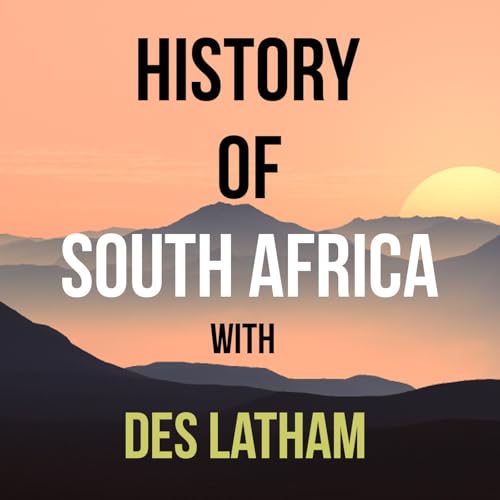
History of South Africa podcast
No se pudo agregar al carrito
Solo puedes tener X títulos en el carrito para realizar el pago.
Add to Cart failed.
Por favor prueba de nuevo más tarde
Error al Agregar a Lista de Deseos.
Por favor prueba de nuevo más tarde
Error al eliminar de la lista de deseos.
Por favor prueba de nuevo más tarde
Error al añadir a tu biblioteca
Por favor intenta de nuevo
Error al seguir el podcast
Intenta nuevamente
Error al dejar de seguir el podcast
Intenta nuevamente
-
Narrado por:
-
De:
-
Desmond Latham
Episodios
-
 22 m
22 mNo se pudo agregar al carrito
Solo puedes tener X títulos en el carrito para realizar el pago.Add to Cart failed.
Por favor prueba de nuevo más tardeError al Agregar a Lista de Deseos.
Por favor prueba de nuevo más tardeError al eliminar de la lista de deseos.
Por favor prueba de nuevo más tardeError al añadir a tu biblioteca
Por favor intenta de nuevoError al seguir el podcast
Intenta nuevamenteError al dejar de seguir el podcast
Intenta nuevamente -
 Sep 21 202520 m
Sep 21 202520 mNo se pudo agregar al carrito
Solo puedes tener X títulos en el carrito para realizar el pago.Add to Cart failed.
Por favor prueba de nuevo más tardeError al Agregar a Lista de Deseos.
Por favor prueba de nuevo más tardeError al eliminar de la lista de deseos.
Por favor prueba de nuevo más tardeError al añadir a tu biblioteca
Por favor intenta de nuevoError al seguir el podcast
Intenta nuevamenteError al dejar de seguir el podcast
Intenta nuevamente -
 Sep 14 202525 m
Sep 14 202525 mNo se pudo agregar al carrito
Solo puedes tener X títulos en el carrito para realizar el pago.Add to Cart failed.
Por favor prueba de nuevo más tardeError al Agregar a Lista de Deseos.
Por favor prueba de nuevo más tardeError al eliminar de la lista de deseos.
Por favor prueba de nuevo más tardeError al añadir a tu biblioteca
Por favor intenta de nuevoError al seguir el podcast
Intenta nuevamenteError al dejar de seguir el podcast
Intenta nuevamente
Longform history
Se ha producido un error. Vuelve a intentarlo dentro de unos minutos.
Fantastic and necessary!
Se ha producido un error. Vuelve a intentarlo dentro de unos minutos.
On a personal note — As an immigrant to South Africa, I really appreciate the availability of this material as well as listening to his pronunciation of people, places and things relevant to South Africa.
Impressive
Se ha producido un error. Vuelve a intentarlo dentro de unos minutos.
"Don't shout at me folks. This is a series that is trying to deliver direct historical blows rather than quaint emotional propaganda. Your going to hear a lot more that may make you revise what you think of as part of our past."
Thank you Mr. Latham for your dedication to the truth and willingness to impart your extensive knowledge on others.
Fantastic Podcast
Se ha producido un error. Vuelve a intentarlo dentro de unos minutos.


